人教版九年级全册Unit 4 I used to be afraid of the dark.Section B. (1a-1e)课件(共26张PPT)
文档属性
| 名称 | 人教版九年级全册Unit 4 I used to be afraid of the dark.Section B. (1a-1e)课件(共26张PPT) |
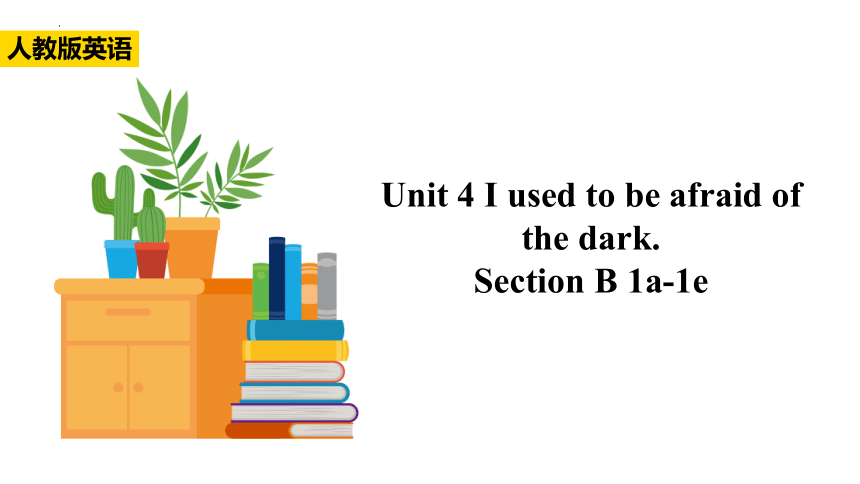
|
|
| 格式 | zip | ||
| 文件大小 | 9.4MB | ||
| 资源类型 | 教案 | ||
| 版本资源 | 人教新目标(Go for it)版 | ||
| 科目 | 英语 | ||
| 更新时间 | 2022-10-21 00:00:00 | ||
图片预览

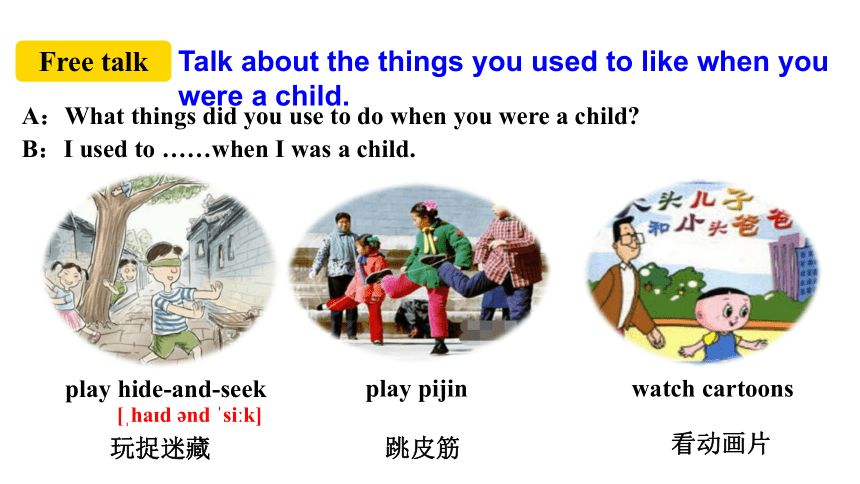
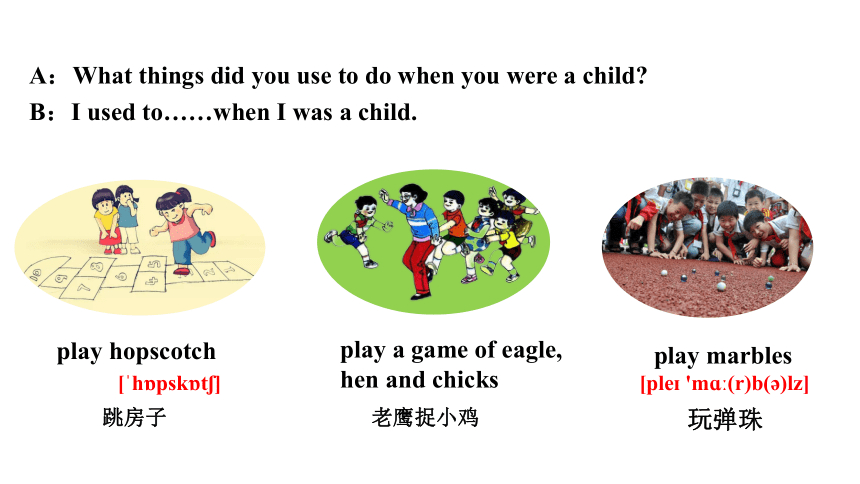
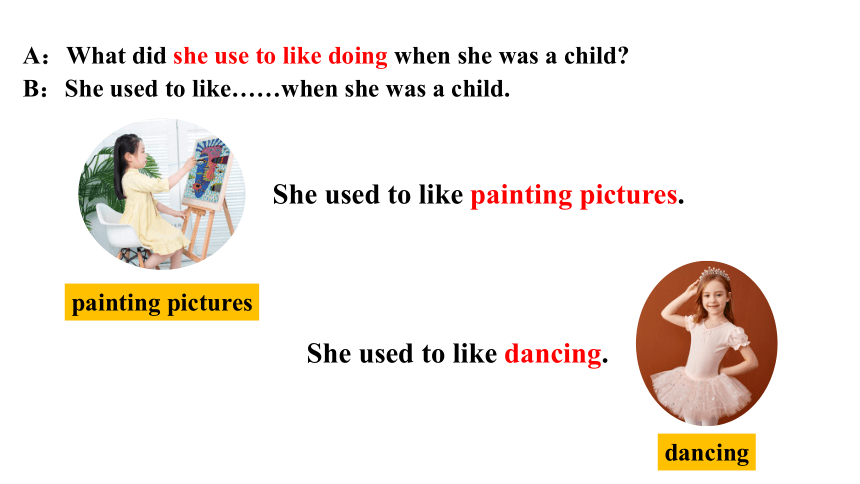
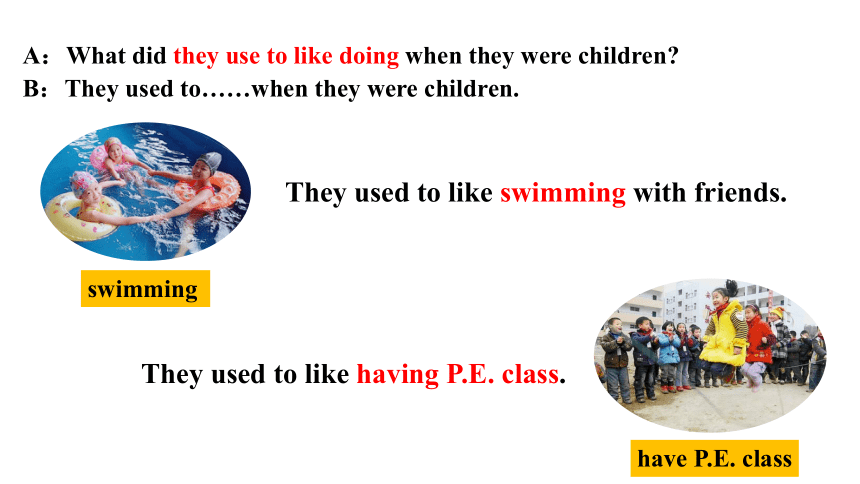
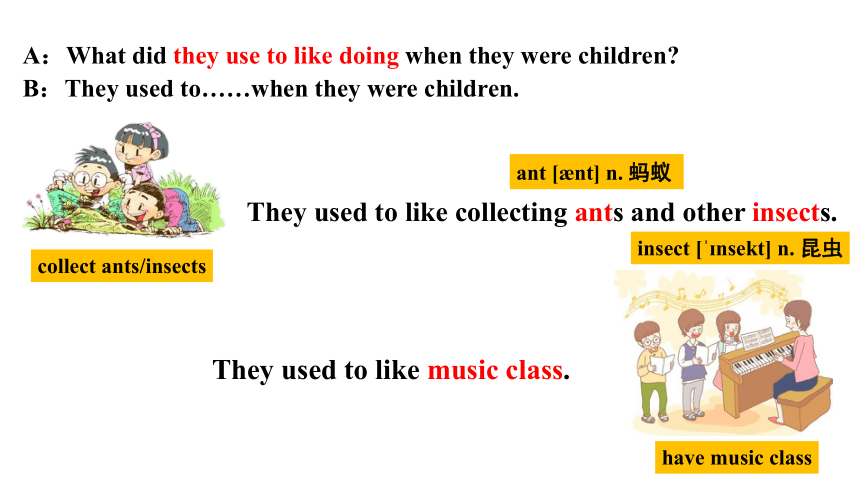
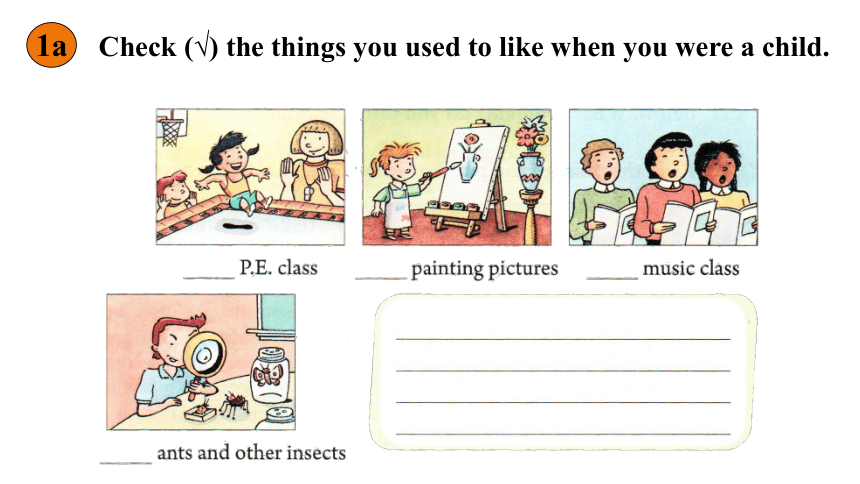
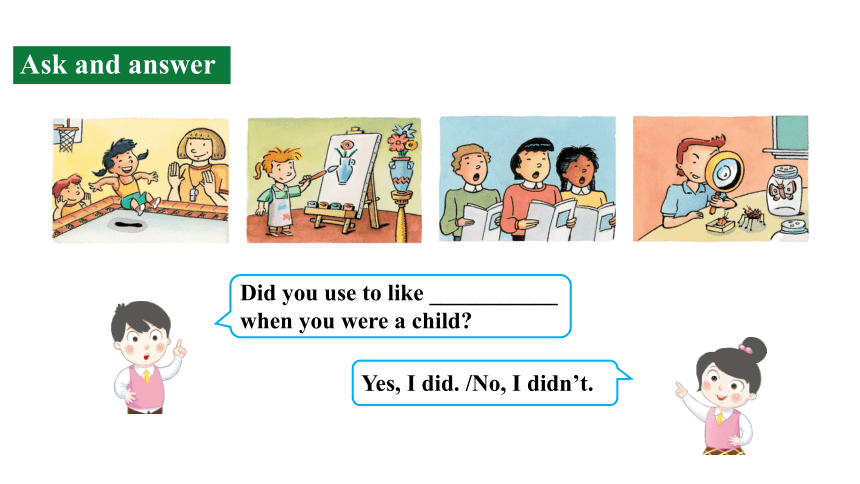
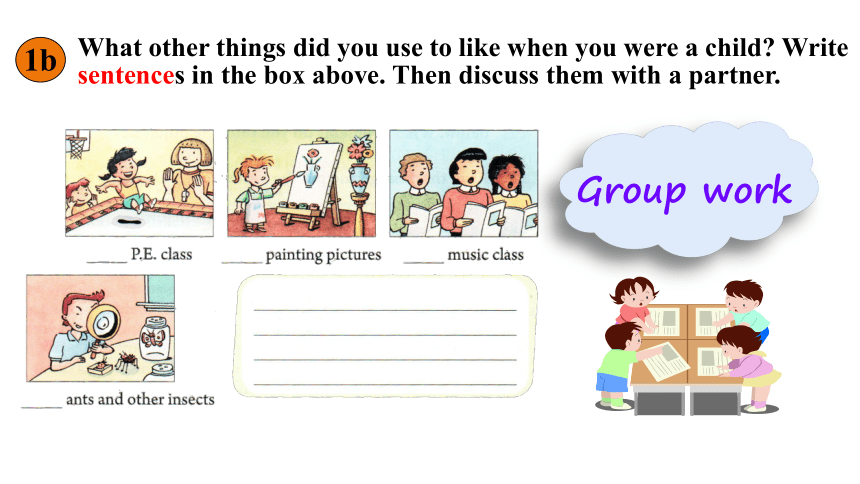
文档简介
(共26张PPT)
人教版英语
Unit 4 I used to be afraid of the dark.
Section B 1a-1e
人教版英语
A:What things did you use to do when you were a child
B:I used to ……when I was a child.
play hide-and-seek
[ ha d nd si k]
玩捉迷藏
watch cartoons
看动画片
Free talk
Talk about the things you used to like when you were a child.
play pijin
跳皮筋
play a game of eagle, hen and chicks
老鹰捉小鸡
play hopscotch
[ h psk t ]
跳房子
A:What things did you use to do when you were a child
B:I used to……when I was a child.
play marbles
[ple 'mɑ (r)b( )lz]
玩弹珠
A:What did she use to like doing when she was a child
B:She used to like……when she was a child.
painting pictures
She used to like painting pictures.
dancing
She used to like dancing.
A:What did they use to like doing when they were children
B:They used to……when they were children.
They used to like swimming with friends.
They used to like having P.E. class.
swimming
have P.E. class
They used to like music class.
They used to like collecting ants and other insects.
A:What did they use to like doing when they were children
B:They used to……when they were children.
collect ants/insects
have music class
ant [ nt] n. 蚂蚁
insect [ nsekt] n. 昆虫
1a
Check (√) the things you used to like when you were a child.
Ask and answer
Did you use to like ___________ when you were a child
Yes, I did. /No, I didn’t.
1b
What other things did you use to like when you were a child Write sentences in the box above. Then discuss them with a partner.
Group work
I used to like playing football.
I used to like eating a lot of candies .
I used to like living with my grandparents.
I used to like chewing gum a lot.
I used to like raising a big dog.
I used to like spending a lot of time playing games with my friends.
Group work
Listen and answer
Different students had different hobbies when they were children. But everyone has changed a lot. What are they talking about
They are talking about their changes.
Tip: Predict in heart and listen for the key sentences.
1c
Listen and check ( ) the sentences you hear.
1. __ I didn’t use to like tests.
2. __ We used to walk to school.
3. __ I used to hate P.E. class.
4. __ I used to be on the soccer team.
1d
Listen again. What do the girl and the boy say about things in the past and now Fill in the chart.
tests
tests
play
study
P.E. class
love
the school uniform
whatever we like
Listen and fill in the blanks.
Girl: My six-year-old brother started school this week.
Boy: Oh, that’s good. Life was great when I was six.
Girl: Really Why
Boy: Oh, school was really easy.
Girl: Not for me. I ______________ like tests. Now I don’t worry about tests, but I really __________ very nervous about them.
Boy: But the tests in primary school were easy!
Girl: Well, yes, they weren’t too difficult. But I guess I _______________ them yet. I think I still like high school more than primary school.
Boy: But we __________ play every day after school. Now we just study all the time.
Girl: Yeah, but we _________ have to wear the school uniform. Now we can wear whatever we like.
Boy: I don’t mind wearing a school uniform. I don’t like thinking about what to wear every day! I do remember one bad thing about primary school though. I _________ hate P.E. class. Now I love it.
Girl: Oh, me, too!
didn’t use to
used to be
wasn’t used to
used to
used to
used to
P137~138
be nervous about 对……感到紧张
1. Did the girl use to like tests when she was six
2. What does the boy think of the tests in primary school
3. Did they use to wear school uniform when they were in primary
4. What did the boy think of the school uniform in primary school
5. What did the boy use to hate in primary school
No, she didn’t.
He thinks they were easy.
Yes, they did.
He didn’t mind wearing a school uniform.
He used to hate P.E. class.
Try to answer the questions below.
Task
Make a report like this: The girl used to …, but now…
The boy used to …, but now…
In the past
Now
In the past
Now
A girl and a boy are talking about
things in the past and now. The girl
didn’t use to like tests, but now she
doesn’t worry about them. In
addition, they used to wear the
school uniform to school, but now
they can wear whatever they like to
school.
As for the boy, he used to hate
P.E. class, but now he loves it.
What’s more, they used to play
every day after school, but now
they study all the time.
KEY Phrases
1. 上体育课: have P.E. class
2. 画画: paint pictures
3. 穿校服: wear the school uniform
4. 上音乐课: have music class
5. 每天放学后玩: play every day after school
6. 考试紧张: be nervous about tests
Summary
一、用所给单词的适当形式填空。
paint, walk, do, on, have to
1.My brother used to ______ to school, but now he drives his car.
2. My bike was broken. I ________ walk to school yesterday.
3. The boy likes _______________ pictures very much.
4. Jim hates _____ homework, so he doesn’t do well in his study.
5. You play baseball well. Are you _______ the baseball team
doing
on
walk
had to
painting/to paint
二、按要求改写句子。
Tom used to have long hair.(改为一般疑问句)
_____ Tom ______ to have long hair
The boy used to wear glasses.(改为反意疑问句)
The boy used to wear glasses, ______ ______
My father often rode his bike to work last year. (改为同义句)
My father _______ ______ ride his bike to work last year.
4. John used to collect stamps.(对划线部分提问)
_____ _____ John ______ ____ _____
5. She used to do exercise in the morning.(改为否定句)
She ______ ______ ______ do exercise in the morning.
6. He hardly watches TV. (变为反意疑问句)
He hardly watches TV, _______ ______
Did use
didn’t he
used to
What did use to do
didn’t use to
does he
人教版英语
Thank you
人教版英语
worry about对……担心; 忧虑
worry about sb. /sth. 意为“为某人/某事而焦虑、烦恼、担心, 担心某人/某事”。
Language points
I don’t worry about tests. 我不担心考试。
Don’t worry about Tom. He’ll be back soon.
不必为汤姆担忧。他马上就回来。
拓展:worry的常见三种用法
(1)worry可作及物动词, 意为“使烦恼, 使焦虑”, 常接sb. 作宾语。
什么事使你这么担心 What worried you so much
(2)worry也可作不及物动词, 意为“烦恼; 担心”, 后常跟介词about。
老师经常担心我们的安全。
Our teacher often worries about our safety.
(3)worry后接从句时, 也表示“为……担心”。
这位老师担心此次考试对她的学生来说可能太难了些。
The teacher worried that the exam might be too difficult for her students.
【学以致用】
①Don’t________ (担心). We can get there on time.
②Don’t________ _______ (担心)your daughter. She is old enough.
③—How is Helen in the new school
—She is doing very well. There is nothing to worry______.
A. about B. of C. with D. /
worry
worry about
all the time一直; 总是
worry about sb. /sth. 意为“为某人/某事而焦虑、烦恼、担心, 担心某人/某事”。
【妙辨异同】always与all the time
两者都可意为“总是, 一直”, 但其用法有所不同。具体用法见下表:
always 侧重于频率, 表示周期性的规律, 含有“每逢……都是”的意思 通常位于实义动词之前, 助动词或连系动词之后
all the time 侧重于一段时间内连续的动作, 或时间上的不间断, 表示始终如一、没有停止 通常位于句末
【学以致用】
①她总是很忙。She is busy_____________.
②晚饭后他总是去散步。
He_________ takes a walk after dinner.
③ He _______ gets up early every morning.
A. all the time B. all time
C. always
all the time
always
辨析:at times / at all times / all the time
at times 不时; 偶尔
I make mistakes at times when I speak English.我说英语偶尔会出错。
at all times 随时; 任何时候; 总是
He has a cool head at all times. 他随时都有清醒的头脑。
all the time 一直; 始终 (time用单数形式)
The baby cries all the time.那婴儿一直哭。
【学以致用】
It’s rather cold in most of South China ______ in spring.
A. on time B. at a time
C. at times D. all the time
be nervous about意为“对……感到紧张”,about 为介词,后接名词、代词或动词的-ing形式作宾语。
There is nothing to be nervous about.没什么可紧张的。
辨析: nervous 和 anxious
nervous:在事情发展的过程中有一种怕的感觉=rather afraid
anxious: 由于害怕某种事情会发生而感到焦急、担心 =worried
I’m always nervous when I have to make a speech.
在必须演讲时我总感到紧张。
Your mother will be anxious until she hears you’re safe.
你妈妈只有在听到你安然无恙时才会放下心来。
人教版英语
Unit 4 I used to be afraid of the dark.
Section B 1a-1e
人教版英语
A:What things did you use to do when you were a child
B:I used to ……when I was a child.
play hide-and-seek
[ ha d nd si k]
玩捉迷藏
watch cartoons
看动画片
Free talk
Talk about the things you used to like when you were a child.
play pijin
跳皮筋
play a game of eagle, hen and chicks
老鹰捉小鸡
play hopscotch
[ h psk t ]
跳房子
A:What things did you use to do when you were a child
B:I used to……when I was a child.
play marbles
[ple 'mɑ (r)b( )lz]
玩弹珠
A:What did she use to like doing when she was a child
B:She used to like……when she was a child.
painting pictures
She used to like painting pictures.
dancing
She used to like dancing.
A:What did they use to like doing when they were children
B:They used to……when they were children.
They used to like swimming with friends.
They used to like having P.E. class.
swimming
have P.E. class
They used to like music class.
They used to like collecting ants and other insects.
A:What did they use to like doing when they were children
B:They used to……when they were children.
collect ants/insects
have music class
ant [ nt] n. 蚂蚁
insect [ nsekt] n. 昆虫
1a
Check (√) the things you used to like when you were a child.
Ask and answer
Did you use to like ___________ when you were a child
Yes, I did. /No, I didn’t.
1b
What other things did you use to like when you were a child Write sentences in the box above. Then discuss them with a partner.
Group work
I used to like playing football.
I used to like eating a lot of candies .
I used to like living with my grandparents.
I used to like chewing gum a lot.
I used to like raising a big dog.
I used to like spending a lot of time playing games with my friends.
Group work
Listen and answer
Different students had different hobbies when they were children. But everyone has changed a lot. What are they talking about
They are talking about their changes.
Tip: Predict in heart and listen for the key sentences.
1c
Listen and check ( ) the sentences you hear.
1. __ I didn’t use to like tests.
2. __ We used to walk to school.
3. __ I used to hate P.E. class.
4. __ I used to be on the soccer team.
1d
Listen again. What do the girl and the boy say about things in the past and now Fill in the chart.
tests
tests
play
study
P.E. class
love
the school uniform
whatever we like
Listen and fill in the blanks.
Girl: My six-year-old brother started school this week.
Boy: Oh, that’s good. Life was great when I was six.
Girl: Really Why
Boy: Oh, school was really easy.
Girl: Not for me. I ______________ like tests. Now I don’t worry about tests, but I really __________ very nervous about them.
Boy: But the tests in primary school were easy!
Girl: Well, yes, they weren’t too difficult. But I guess I _______________ them yet. I think I still like high school more than primary school.
Boy: But we __________ play every day after school. Now we just study all the time.
Girl: Yeah, but we _________ have to wear the school uniform. Now we can wear whatever we like.
Boy: I don’t mind wearing a school uniform. I don’t like thinking about what to wear every day! I do remember one bad thing about primary school though. I _________ hate P.E. class. Now I love it.
Girl: Oh, me, too!
didn’t use to
used to be
wasn’t used to
used to
used to
used to
P137~138
be nervous about 对……感到紧张
1. Did the girl use to like tests when she was six
2. What does the boy think of the tests in primary school
3. Did they use to wear school uniform when they were in primary
4. What did the boy think of the school uniform in primary school
5. What did the boy use to hate in primary school
No, she didn’t.
He thinks they were easy.
Yes, they did.
He didn’t mind wearing a school uniform.
He used to hate P.E. class.
Try to answer the questions below.
Task
Make a report like this: The girl used to …, but now…
The boy used to …, but now…
In the past
Now
In the past
Now
A girl and a boy are talking about
things in the past and now. The girl
didn’t use to like tests, but now she
doesn’t worry about them. In
addition, they used to wear the
school uniform to school, but now
they can wear whatever they like to
school.
As for the boy, he used to hate
P.E. class, but now he loves it.
What’s more, they used to play
every day after school, but now
they study all the time.
KEY Phrases
1. 上体育课: have P.E. class
2. 画画: paint pictures
3. 穿校服: wear the school uniform
4. 上音乐课: have music class
5. 每天放学后玩: play every day after school
6. 考试紧张: be nervous about tests
Summary
一、用所给单词的适当形式填空。
paint, walk, do, on, have to
1.My brother used to ______ to school, but now he drives his car.
2. My bike was broken. I ________ walk to school yesterday.
3. The boy likes _______________ pictures very much.
4. Jim hates _____ homework, so he doesn’t do well in his study.
5. You play baseball well. Are you _______ the baseball team
doing
on
walk
had to
painting/to paint
二、按要求改写句子。
Tom used to have long hair.(改为一般疑问句)
_____ Tom ______ to have long hair
The boy used to wear glasses.(改为反意疑问句)
The boy used to wear glasses, ______ ______
My father often rode his bike to work last year. (改为同义句)
My father _______ ______ ride his bike to work last year.
4. John used to collect stamps.(对划线部分提问)
_____ _____ John ______ ____ _____
5. She used to do exercise in the morning.(改为否定句)
She ______ ______ ______ do exercise in the morning.
6. He hardly watches TV. (变为反意疑问句)
He hardly watches TV, _______ ______
Did use
didn’t he
used to
What did use to do
didn’t use to
does he
人教版英语
Thank you
人教版英语
worry about对……担心; 忧虑
worry about sb. /sth. 意为“为某人/某事而焦虑、烦恼、担心, 担心某人/某事”。
Language points
I don’t worry about tests. 我不担心考试。
Don’t worry about Tom. He’ll be back soon.
不必为汤姆担忧。他马上就回来。
拓展:worry的常见三种用法
(1)worry可作及物动词, 意为“使烦恼, 使焦虑”, 常接sb. 作宾语。
什么事使你这么担心 What worried you so much
(2)worry也可作不及物动词, 意为“烦恼; 担心”, 后常跟介词about。
老师经常担心我们的安全。
Our teacher often worries about our safety.
(3)worry后接从句时, 也表示“为……担心”。
这位老师担心此次考试对她的学生来说可能太难了些。
The teacher worried that the exam might be too difficult for her students.
【学以致用】
①Don’t________ (担心). We can get there on time.
②Don’t________ _______ (担心)your daughter. She is old enough.
③—How is Helen in the new school
—She is doing very well. There is nothing to worry______.
A. about B. of C. with D. /
worry
worry about
all the time一直; 总是
worry about sb. /sth. 意为“为某人/某事而焦虑、烦恼、担心, 担心某人/某事”。
【妙辨异同】always与all the time
两者都可意为“总是, 一直”, 但其用法有所不同。具体用法见下表:
always 侧重于频率, 表示周期性的规律, 含有“每逢……都是”的意思 通常位于实义动词之前, 助动词或连系动词之后
all the time 侧重于一段时间内连续的动作, 或时间上的不间断, 表示始终如一、没有停止 通常位于句末
【学以致用】
①她总是很忙。She is busy_____________.
②晚饭后他总是去散步。
He_________ takes a walk after dinner.
③ He _______ gets up early every morning.
A. all the time B. all time
C. always
all the time
always
辨析:at times / at all times / all the time
at times 不时; 偶尔
I make mistakes at times when I speak English.我说英语偶尔会出错。
at all times 随时; 任何时候; 总是
He has a cool head at all times. 他随时都有清醒的头脑。
all the time 一直; 始终 (time用单数形式)
The baby cries all the time.那婴儿一直哭。
【学以致用】
It’s rather cold in most of South China ______ in spring.
A. on time B. at a time
C. at times D. all the time
be nervous about意为“对……感到紧张”,about 为介词,后接名词、代词或动词的-ing形式作宾语。
There is nothing to be nervous about.没什么可紧张的。
辨析: nervous 和 anxious
nervous:在事情发展的过程中有一种怕的感觉=rather afraid
anxious: 由于害怕某种事情会发生而感到焦急、担心 =worried
I’m always nervous when I have to make a speech.
在必须演讲时我总感到紧张。
Your mother will be anxious until she hears you’re safe.
你妈妈只有在听到你安然无恙时才会放下心来。
同课章节目录
- Unit 1 How can we become good learners.
- Section A
- Section B
- Unit 2 I think that mooncakes are delicious!
- Section A
- Section B
- Unit 3 Could you please tell me where the restroom
- Section A
- Section B
- Unit 4 I used to be afraid of the dark.
- Section A
- Section B
- Unit 5 What are the shirts made of?
- Section A
- Section B
- Review of Units 1-5
- Unit 6 When was it invented?
- Section A
- Section B
- Unit 7 Teenagers should be allowed to choose their
- Section A
- Section B
- Unit 8 It must belong to Carla.
- Section A
- Section B
- Unit 9 I like music that I can dance to.
- Section A
- Section B
- Unit 10 You're supposed to shake hands.
- Section A
- Section B
- Review of Units 6-10
- Unit 11 Sad movies make me cry.
- Section A
- Section B
- Unit 12 Life is full of the unexpected
- Section A
- Section B
- Unit 13 We're trying to save the earth!
- Section A
- Section B
- Unit 14 I remember meeting all of you in Grade 7.
- Section A
- Section B
- Review of Units 11-14
